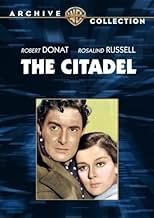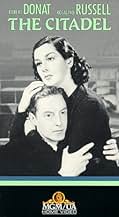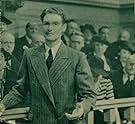IMDb RATING
7.0/10
2.6K
YOUR RATING
An enthusiastic young doctor happily embarks on his career, but it isn't long before he finds out what being a doctor really entails.An enthusiastic young doctor happily embarks on his career, but it isn't long before he finds out what being a doctor really entails.An enthusiastic young doctor happily embarks on his career, but it isn't long before he finds out what being a doctor really entails.
- Nominated for 4 Oscars
- 9 wins & 4 nominations total
Penelope Dudley-Ward
- Toppy LeRoy
- (as Penelope Dudley Ward)
Francis L. Sullivan
- Ben Chenkin
- (as Francis Sullivan)
7.02.5K
1
2
3
4
5
6
7
8
9
10
Featured reviews
Breaching the Citadel
The Citadel is a fine and inspirational film about a dedicated young doctor and the hardships he has to overcome to see his destiny and move to fulfill it. A lot of the same ground was covered before in Arrowsmith and would be covered again in Not As A Stranger and then in over a dozen or more medical drama shows on television. Stories about medicine and its practice is a genre we will never tire of.
Robert Donat plays the idealistic young doctor who is assigned a number of positions in Great Britain and the story is how he deals with the various situations he encounters. Along the way he picks up a wife in the person of Rosalind Russell.
For an American to review this film probably one should have a knowledge of the British health system and remember this would have been before the days of the current health system of socialized medicine. That system was put in before the post World War II Labour government changed things.
One of his assignments is a coalmining area in Wales and Donat because of his own integrity and commitment manages to make a whole bunch of enemies and has to leave. His assignment is in what might be described as an HMO run by the coal miner's union. He starts doing research in a chronic cough he notices several of the miners have and upsets a whole lot of applecarts both with labor and management. He also isn't so easy with giving sick slips to malingering workers and they don't come to his defense. Not easy at times to be an idealist.
For a while Donat takes an easy road in a wealthy sanitarium that caters to upper class hypochondriacs. Doctors Felix Aylmer and Rex Harrison are getting rich themselves off them. But eventually Donat finds his true calling in research.
Rosalind Russell said that working with Donat was a pleasure, but the film itself wasn't. She and Director King Vidor were the only Americans in this film and she and Vidor took a lot of criticism for taking jobs away from British players. Not like she had anything to say about it, MGM loaned her out there. Still she did her job without a trace of a British accent.
Besides Aylmer and Harrison other noteworthy British players in the cast are Emlyn Williams and Francis L. Sullivan. Williams is one of the local union heads and Sullivan is a blustering boorish lout of a miner who leads the opposition to Donat's research. All of them do fine jobs and Harrison got his first real notice by American audiences in his role.
Because for two generations we Americans have been awash with medical dramas all these situations seem all to familiar to us. That's a jaded point of view. The Citadel is a fine drama and worth seeing.
Robert Donat plays the idealistic young doctor who is assigned a number of positions in Great Britain and the story is how he deals with the various situations he encounters. Along the way he picks up a wife in the person of Rosalind Russell.
For an American to review this film probably one should have a knowledge of the British health system and remember this would have been before the days of the current health system of socialized medicine. That system was put in before the post World War II Labour government changed things.
One of his assignments is a coalmining area in Wales and Donat because of his own integrity and commitment manages to make a whole bunch of enemies and has to leave. His assignment is in what might be described as an HMO run by the coal miner's union. He starts doing research in a chronic cough he notices several of the miners have and upsets a whole lot of applecarts both with labor and management. He also isn't so easy with giving sick slips to malingering workers and they don't come to his defense. Not easy at times to be an idealist.
For a while Donat takes an easy road in a wealthy sanitarium that caters to upper class hypochondriacs. Doctors Felix Aylmer and Rex Harrison are getting rich themselves off them. But eventually Donat finds his true calling in research.
Rosalind Russell said that working with Donat was a pleasure, but the film itself wasn't. She and Director King Vidor were the only Americans in this film and she and Vidor took a lot of criticism for taking jobs away from British players. Not like she had anything to say about it, MGM loaned her out there. Still she did her job without a trace of a British accent.
Besides Aylmer and Harrison other noteworthy British players in the cast are Emlyn Williams and Francis L. Sullivan. Williams is one of the local union heads and Sullivan is a blustering boorish lout of a miner who leads the opposition to Donat's research. All of them do fine jobs and Harrison got his first real notice by American audiences in his role.
Because for two generations we Americans have been awash with medical dramas all these situations seem all to familiar to us. That's a jaded point of view. The Citadel is a fine drama and worth seeing.
10madshell
A Moving Film of Medicine and Morals
A morality tale of medicine, this film brilliantly illustrates the plight of a doctor who truly cares for healing the sick -- yet even finds his patients to be dishonest. Robert Donat is superb in his transformation from a good doctor to a money making doctor for the rich. Roselyn Russell compliments his performance with her own emotional struggle, as she watches her husband all but lose his heart. Brilliant direction from early veteran director King Vidor gives this film a worthy place in film history. This is a must see for any doctor -- IMHO.
Excellent cast, script in a tale of ethics vs. ease
This film features an excellent cast, ably led by Robert Donat in a performance that is superior to his marvelous performance one year later in Goodbye, Mr. Chips. As a young doctor, he begins with the highest intentions, gradually becoming cynical and disillusioned. He decides it's better to have money than scruples, with predictable results. Outstanding work as well by Rex Harrison and Rosiland Russell and a very good script. Most recommended.
Perfect - i'm only sad that it hasn't been rediscovered yet...
I wasn't too sure what to think of Vidor after Our Daily Bread. Usually, filmmakers who have a message to get across, and who don't do it all that subtly, rub me the wrong way. But after seeing The Citadel i'm starting to rethink King Vidor. Indeed i thought Our Daily Bread a very fine film, certainly from the standpoint of direction. But what Bread lacked in the two lead performances (which are quite corny and camp), has been perfected in The Citadel, where we are given two marvellous performances from Robert Donat and Rosalind Russell. And i didn't have the same feeling about Vidor's message-making in Citadel that i did in Bread. It is more subtle in Citadel, and also for a better cause (altruism in the medical profession, a very noble thing, as opposed to socialism, the subject preached about in Our Daily Bread). But now i've started thinking this about Vidor:
He was a passionate artist - how much do i prefer this to someone like Rossellini who didn't think much of movies, or someone like Bergman, who often (he can be optimistic) depicts human nature as an empty, valueless abcess. The fact that he expresses such strong messages, and that in fact he has something that he finds of value, is immensely reassuring. I get so used to railing against preachy filmmakers that i seem to equate non-preachiness with cynicism, and even nihilism. Well, one doesn't have to dispise everything to make a wonderful film, which is what Vidor has done here.
Everything works in The Citadel. It draws you very nicely, without pomp or flashiness, but with immense skill, into its environment, and what a lovely environment it is. You so badly want nothing bad to happen to earnest, idealistic young doctor's assistant Dr Andrew Manson. I hesitate to use the word perfection, but there is a real perfection to this movie. And i was more than a little bit moved by it. I really enjoyed it, i just thought it was wonderful. Mr Vidor really was a king.
He was a passionate artist - how much do i prefer this to someone like Rossellini who didn't think much of movies, or someone like Bergman, who often (he can be optimistic) depicts human nature as an empty, valueless abcess. The fact that he expresses such strong messages, and that in fact he has something that he finds of value, is immensely reassuring. I get so used to railing against preachy filmmakers that i seem to equate non-preachiness with cynicism, and even nihilism. Well, one doesn't have to dispise everything to make a wonderful film, which is what Vidor has done here.
Everything works in The Citadel. It draws you very nicely, without pomp or flashiness, but with immense skill, into its environment, and what a lovely environment it is. You so badly want nothing bad to happen to earnest, idealistic young doctor's assistant Dr Andrew Manson. I hesitate to use the word perfection, but there is a real perfection to this movie. And i was more than a little bit moved by it. I really enjoyed it, i just thought it was wonderful. Mr Vidor really was a king.
One of the better British films of the 'thirties
"The Citadel" is one of those circular morality fables - idealistic young man sets out full of good intentions to put the world to right, but, finding his dreams dashed by prejudice and ignorance, throws in his lot with the protection of an easy but dishonest life only to realise the error of his ways through personal tragedy with consequent redemption. A;though stylistically and culturally a world apart, it is thematically a precursor of Mizoguchi's "Sansho Dayu". Made in great Britain in 1938, its MGM backing certainly shows in higher production values than most home grown films of the period - and this in spite of much reliance on back projection of the sort that even the great Carol Reed could not always effectively disguise. One of Hollywood's top directors, King Vidor, invests it with visual quality and, in a part that could have been tailored for Greer Garson, Rosalind Russell makes a surprisingly convincing female lead, supporting the hero throughout his tribulations with every ounce of Garsonian understanding he needs. But it is Robert Donat as the idealistic doctor, who first tries his professional hand in the dark Welsh colliery valley, that is the film's greatest strength. Here was an actor who brought a sense of dignity and integrity to every role he undertook from the earliest Richard Hannay to the Chinese nobleman in "The Inn of the Sixth Happiness" which he was brave enough to play when he was literally gasping for breath. His performance in "The Citadel" is not entirely free from cliché but I imagine this was something imposed by the conventions of the period. How else to explain that when he becomes mean and mercenary he suddenly sports a very short and unsympathetic moustache which, if memory serves me right, miraculously disappears for the final scene of redemption. For the rest there is a galaxy of British acting talent to be found among the supporting roles with a brief glimpse of the dignified Nora Swinburne and a few more of a youthful Francis L. Sullivan doing his obese bigot stuff with rather less brains than usual. And as if this was not all, there is "Sexy Rexy" Harrison gracing the Harley Street scene, Cecil Parker playing a particularly odious surgeon who would no doubt be struck off the Medical Register if he were around today and the great Ralph Richardson investing the role of Donat's best friend with just about the right amount of Shakespearean rhetoric that the part will support. All in all a veritable treat provided you suspend just a little bit of disbelief.
Did you know
- GoofsWhen Andrew examines Christine's throat, he sits in front of a light that is supposedly reflected into Christine's mouth by his eyepiece. We see this from over Andrew's shoulder, and when the light is directed into her mouth, it is clearly coming from behind Andrew, because the back of his eyepiece is illuminated.
- Quotes
Christine Barlow Manson: Andrew, Do you remember once telling me that a all good research man needed was a notebook, a microscope and a room with a roof over it?
- Crazy creditsPrologue: "This motion picture is a story of individual characterizations and is in no way intended as a reflection on the great medical profession which has done so much towards beating back those forces of nature that retard the physical progress of the human race."
- Alternate versionsAlso shown in computer colorized version.
- ConnectionsFeatured in The Ultimate Film (2004)
- How long is The Citadel?Powered by Alexa
Details
- Runtime
- 1h 50m(110 min)
- Color
- Aspect ratio
- 1.37 : 1
Contribute to this page
Suggest an edit or add missing content






































